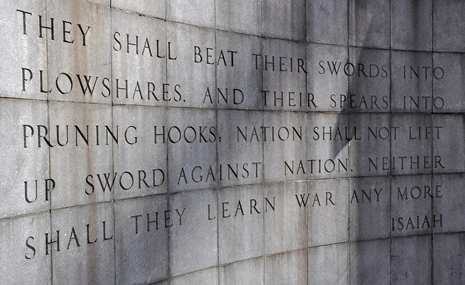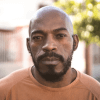How Ralph Bunche made Nobel Prize history
 Ralph Bunche was born in Detroit, Michigan in the early 20th century. He became a world-celebrated diplomat for the United Nations (U. N.) and the first black man Nobel Peace Prize in 1950. On love is all colors, we like to recognize such great minds.
Ralph Bunche was born in Detroit, Michigan in the early 20th century. He became a world-celebrated diplomat for the United Nations (U. N.) and the first black man Nobel Peace Prize in 1950. On love is all colors, we like to recognize such great minds.
Keep scrolling to find out more about this iconic man…
Find your soulmate on InterracialDatingCentral










What contribution did he make that led to the Nobel Prize honor?
Peace Negotiations in the Middle East
Bunche received the honor largely because of making peace in the Middle East. The world knows him for his patience and optimism, qualities that can be attributed to his success in negotiating peaceful settlements especially when he was given the rank of the secretary-general for the U.N.
He received this award largely because of the cease-fire he arranged between the Arabs and Israelis during the war, which started after the formation of the state of Israel in 1948.
His contribution didn’t just end there in the Middle East. Dr. Ralph Bunche, who was the first African American Nobel Peace Prize winner was also known for his peacemaking efforts in Africa and the Mediterranean. He also contributed to the civil rights struggles in the United States.
Dr. Bunche’s achievements
Having come from a humble background, where his grandmother raised him, his achievements up to date are admirable. Both in high school and the University of Columbia, he delivered the valedictory for both sets. This begins to show how he was regarded highly by his peers and teachers alike.
Bunche was holding a degree in social science, and he studied colonial policy in West Africa before World War II. He was the first black man to graduate with a doctorate in political science from an American university.
He began teaching and writing books on matters concerning race and politics.
To boost his knowledge, Bunche joined the Swedish social scientist staff, Gunnar Myrdal, who was studying about the racial segregation in the USA. He became the first African American to hold a top job in the State Department in World War II.
Ralph Bunche went into UN service in 1946. Before moving to the United Nation, he worked for Office of Strategic Services which is the CIA now. One of his achievements was his active contribution to creating the Universal Declaration of Human Rights.
A year later, the Secretary-General Trygve Lie sent him to the Middle East. His core assignment was to devise a plan on how to divide Palestine between Arabs and Jews.
The Arabs did not accept the UN resolution with reference to a Jewish state and went to war on Israel. Ralph Bunche replaced the chief UN negotiator Folke Bernadotte after he was murdered in the autumn of 1948 by Jewish extremists. After tough negotiations in 1949, Bunche succeeded in bringing peace among the Arabs and Jews. For setting up peace during the first Arab-Israeli war, Ralph Joseph Bunche became the first African American Nobel Prize winner. He received the award in Oslo, Norway.
Criteria used for the Nobel Prize History
Since its inception in 1901, the Norwegian Nobel Committee used to award this prestigious award through the series of “firsts”. The series includes Bertha von Suttner; the first woman to win received the honor in 1905, Theodore Roosevelt; the first sitting president, who was honored in 1906 and German journalist Carl von Ossietzky won in 1935, and who was the first person to receive the award while in prison.
After a while, everything changed in the Nobel Peace Prize nomination list as the committee recognized someone who is not white, Dr. Ralph Bunche. Bunche, who was the only person to negotiate a ceasefire between Palestinians and Israelis in the late 1940s, earned the honor for his role as the first black Nobel Prize winner.
He began the work that led to his Nobel honor in 1947 – this was when they assigned him to a special U.N. committee on Palestine. They did this following the division and disintegration of Palestine for the pronouncement of the state of Israel in May 1948. This was when Bunche negotiated a ceasefire - it was a fragile peace.
Months later, Bunche was appointed to succeed the lead mediator of the conflict (Swedish Count Folke Bernadotte). This was after Bernadotte’s assassination in the hands of an extremist Jewish faction.
He also led negotiations in early 1949 on the island of Rhodes between Egyptians and the Israelis. His success came when the two African countries signed a truce. And once Egypt signed, other Middle Eastern countries followed suit. These included Lebanon, Jordan, and Syria.
And that was when Bunches nomination for the Nobel Prize came. They recognized him for his leadership skills.
At first, he considered rejecting the award because he believed that it was the job of U.N. officials to negotiate peace. However, the U. N. Secretary-General persuaded him to accept it for the positive publicity he has brought for the organization.
Why he deserved the 1950 Nobel Peace Prize
Ralph Bunche believed in the work of negotiation in Palestine. Before the nomination, the Nobel Committee made reference to one of his lectures. Highlighted is where Bunche talked about the qualities mediators should possess where he said:
“They should unfair against war and for peace. They should understand that no problem related to humans is insolvable. They should be biased against hate, religious, suspicion, intolerance, and racial bigotry.”
When Bunche wanted to reject the Nobel Peace Prize, Chairman Gunnar Jahn said to him:
“You have said that you are an incurable optimist and that you know that the mediation in Palestine would be victorious. You now have a long day's work before you. May this foundation you are laying be successful for the future of mankind.”
Ralph Bunche replied that all he has done was to save the peace and prevent war.
There are many black men and women who have this honor. Many more have contributed greatly to the betterment of the future. Things don't need to end with them. It's everyone's responsibility to make the world better.
Here are some of the feisty black women that were honored lately.
More Opinion Articles
-

Let Your Dating Profile Pictures Do the Hard Work for You
-

Decoding Attention-Seeking in Dating: Nurturing Healthy Connections
-

Should You Be Friends with Your Ex? Exploring the Pros and Cons
-

7 healthy approaches on how to stop being jealous
-

Emotional Intelligence: Navigating the Heart's Language Across Cultures
Responses to "How Ralph Bunche made Nobel Prize history"
Be the first to leave a comment
You must be logged in to post a comment.










































